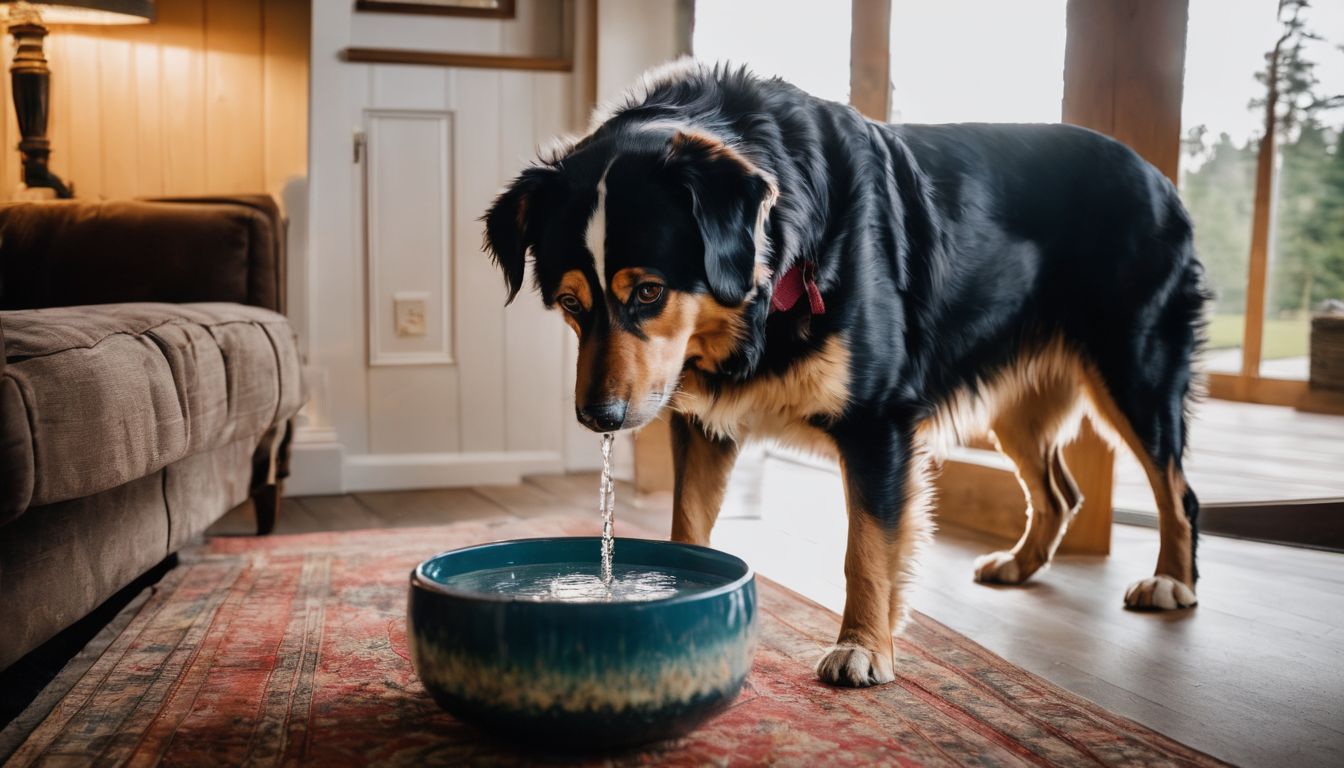Is your senior dog constantly at the water bowl? You could be witnessing a sign of certain health issues common in older dogs. This article will guide you in understanding what excessive drinking can mean for your pet’s well-being and how to best manage their hydration habits. Why is my senior dog drinking so much water?
Tune in, this might just save your furry friend’s life!
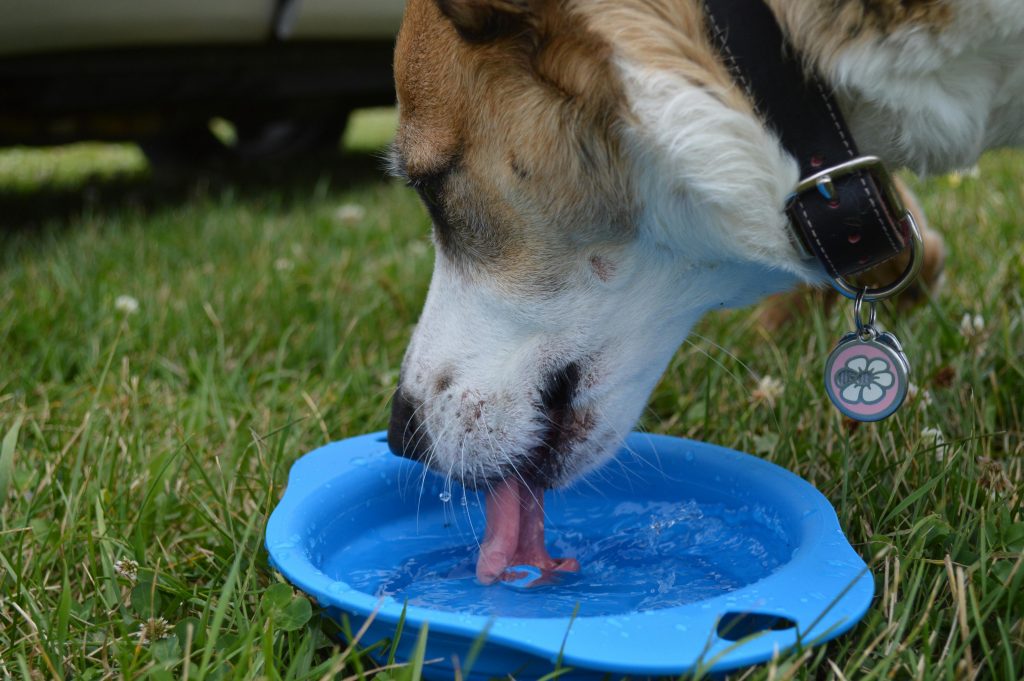
Key Takeaways
- Senior dogs may exhibit excessive drinking behavior, which could be a sign of underlying health issues such as dehydration, urinary tract infections, kidney failure, diabetes mellitus, or Cushing’s disease.
- Monitoring your senior dog’s water intake and comparing it to normal levels can help determine if they are drinking too much water.
- It is important to consult with a veterinarian if you notice significant changes in your senior dog’s water consumption so that appropriate tests and treatment options can be discussed and implemented.
- Regularly providing clean and fresh water for your senior dog is essential to prevent dehydration and maintain their overall health.
Understanding Increased Thirst in Senior Dogs
Determining if your dog is drinking too much water can be done by monitoring their water intake and comparing it to normal levels for dogs.
How to determine if your dog is drinking too much water
First, check how much water your dog drinks in a day. A normal amount is one ounce of water for each pound they weigh. For example, if you have a 30-pound dog, they should drink about 30 ounces of water a day.
You need to watch for big changes in the amount drank. Your dog might be sick if it starts drinking more than this without clear reason – like hot weather or extra play time. Look also at how often your dog pees and if it seems to pee a lot more than before.
This can be another sign that something is not right.
Normal water intake for dogs
Senior dogs, just like humans, need a certain amount of water to stay healthy. On average, a dog should drink about 1 ounce of water per pound of body weight each day. So if your dog weighs 50 pounds, they should be drinking around 50 ounces (or about 6 cups) of water daily.
This is the normal water intake for dogs and helps to keep them hydrated and their organs functioning properly.
It’s important to note that this is just a general guideline and can vary depending on factors such as activity level, temperature, and overall health. Some dogs may need a little more or less water than others.
Five common causes of increased thirst in dogs
There are several common causes for increased thirst in dogs, especially as they get older. One possible cause is dehydration, which can happen if your dog isn’t drinking enough water or if they’re losing excessive amounts of water through things like panting or diarrhea.
Another cause could be a urinary tract infection, which can irritate the bladder and make your dog feel like they need to drink more. Kidney failure is another possibility, as this can affect the body’s ability to regulate fluid levels.
Diabetes mellitus, a condition where the body can’t properly regulate blood sugar levels, may also lead to increased thirst in dogs. Finally, Cushing’s disease, an endocrine disorder that affects hormone production, can also cause excessive thirst in dogs.
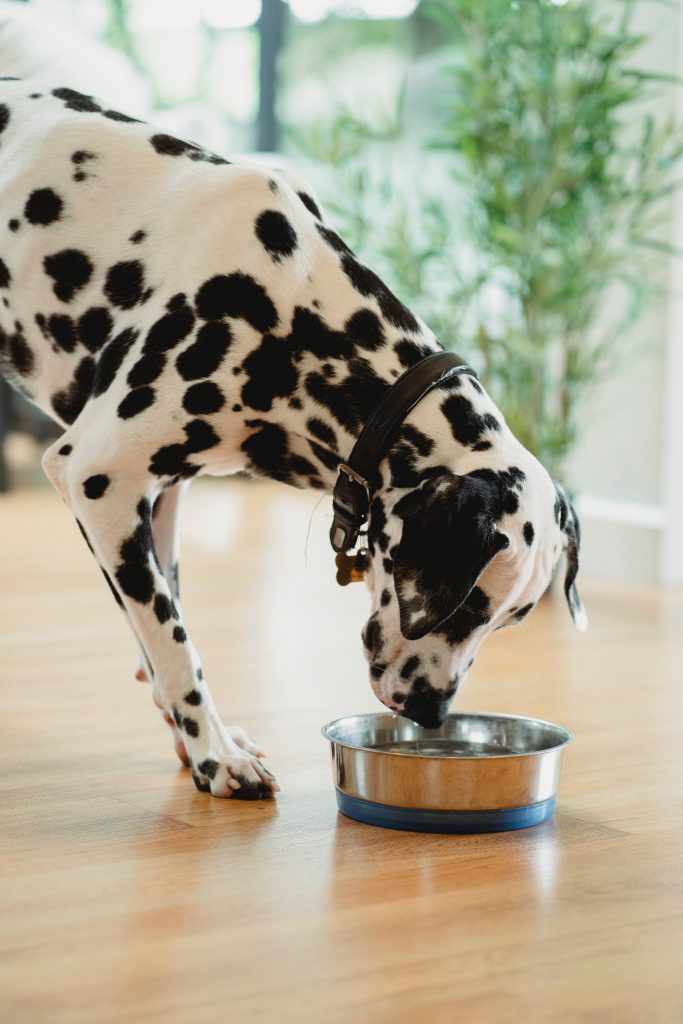
Potential Health Conditions Linked to Increased Drinking
Increased drinking in senior dogs could be a sign of underlying health conditions such as dehydration, urinary tract infections, kidney failure, diabetes mellitus, and Cushing’s disease.
Dehydration
Dehydration is a serious concern for senior dogs, especially if they are drinking excessive amounts of water. It occurs when your dog’s body doesn’t have enough fluids to function properly.
Dehydration can lead to various health problems and even be life-threatening in severe cases. Some common symptoms of dehydration in dogs include dry nose and gums, sunken eyes, lethargy, and loss of appetite.
If you notice these signs or if your dog is drinking more than usual, it’s important to see a veterinarian right away. They can determine the cause of the increased thirst and provide appropriate treatment to prevent dehydration and address any underlying health issues.
Urinary tract infections
Senior dogs can be prone to urinary tract infections, which may contribute to increased drinking. Urinary tract infections occur when bacteria enter the urinary system and cause inflammation and infection.
Symptoms of a urinary tract infection in dogs include frequent urination, straining to urinate, blood in the urine, and increased thirst. If your senior dog is exhibiting these symptoms along with excessive drinking, it’s important to consult a veterinarian for proper diagnosis and treatment.
Urinary tract infections can be treated with antibiotics prescribed by the vet and may require additional tests to rule out any underlying conditions that could be contributing to the infection.
Kidney failure
Kidney failure is a serious medical condition that can cause increased drinking in senior dogs. As dogs age, their kidneys may start to work less effectively, leading to problems with filtering waste from the body.
When the kidneys don’t function properly, toxins and fluids can build up, causing your dog to drink more water. This excessive thirst is often a sign of kidney failure and should not be ignored.
If you notice your senior dog drinking more water than usual, it’s important to visit the veterinarian for a proper diagnosis and treatment options. Early detection and management of kidney failure can help improve your dog’s quality of life and prevent further complications.
Diabetes mellitus
Diabetes mellitus is a condition that can affect senior dogs and cause excessive drinking. It happens when their body doesn’t produce enough insulin or doesn’t use it properly. This leads to high blood sugar levels, which can make them very thirsty.
If your senior dog is drinking more water than usual and also urinating frequently, it’s important to see a veterinarian. They can do tests to diagnose diabetes and recommend the right treatment plan for your furry friend.
Managing diabetes in dogs typically involves medication, diet changes, and regular monitoring of blood sugar levels.
Cushing’s disease
Cushing’s disease is another health condition that can cause excessive drinking in senior dogs. It occurs when the body produces too much cortisol, a hormone that helps regulate various bodily functions.
Common symptoms of Cushing’s disease include increased thirst and urination, weight gain, and a pot-bellied appearance. If you notice these signs in your older dog, it’s important to visit your veterinarian for diagnosis and treatment options.
The vet may recommend blood tests or imaging to confirm the presence of Cushing’s disease. Treatment typically involves medication to manage symptoms and improve your dog’s quality of life.
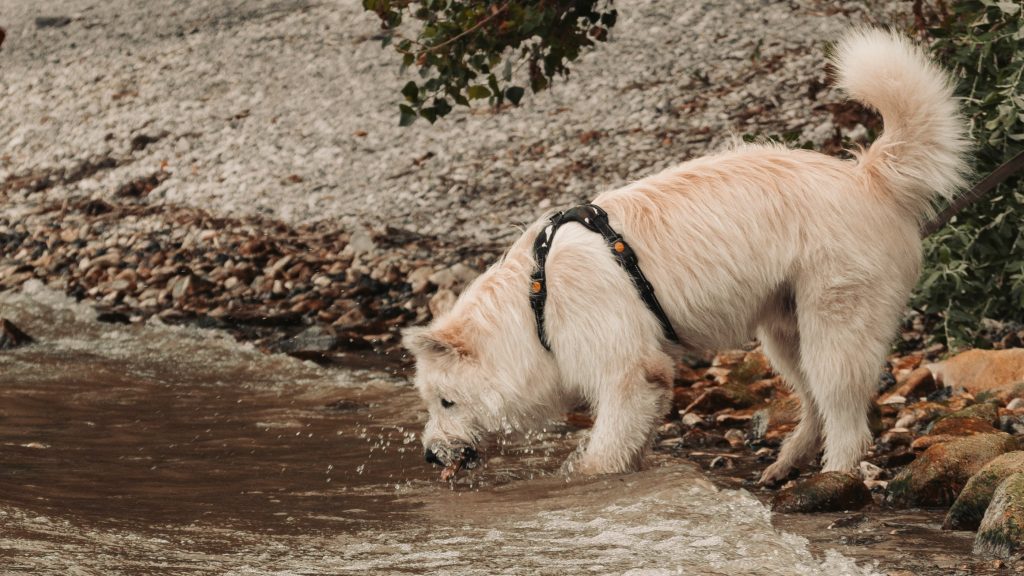
What to Expect When Visiting the Vet
When you visit the vet, they will likely recommend baseline tests to determine the underlying cause of your senior dog’s excessive drinking.
Recommended baseline tests
To ensure the best care for your senior dog with excessive drinking, it’s important to schedule a visit to the veterinarian. The vet will likely recommend some baseline tests to help determine the underlying cause of your dog’s increased thirst.
These tests may include bloodwork, urinalysis, and possibly imaging such as X-rays or ultrasounds. By conducting these tests, the vet can get a better understanding of your dog’s overall health and identify any potential underlying medical conditions that may be causing the excessive drinking.
It’s essential to follow your vet’s recommendations for these baseline tests so that appropriate treatment options can be discussed and implemented if necessary.
Additional tests that may be necessary
Sometimes, your veterinarian may recommend additional tests to determine the cause of your senior dog’s excessive drinking. These tests could include bloodwork, urinalysis, and imaging such as X-rays or ultrasounds.
Bloodwork can help identify any abnormalities in organ function or hormone levels. Urinalysis can provide insights into kidney health and detect signs of infection or other urinary issues.
Imaging can help visualize the internal organs and identify any structural problems that may be contributing to your dog’s increased thirst. These tests are important because they can provide valuable information about your dog’s overall health and guide further treatment options.
Treatment options
If your senior dog is exhibiting excessive drinking behavior, it is important to consult with a veterinarian. They will determine the underlying cause of your dog’s increased thirst and recommend appropriate treatment options.
Depending on the specific health condition, treatment may involve medication, dietary changes, or management strategies to address the root cause. Early detection and intervention can help improve your dog’s quality of life and manage any potential health concerns that may be contributing to their excessive water consumption.
Tips for Monitoring Your Senior Dog’s Water Intake
Regularly monitor and record your senior dog’s water intake, provide clean and fresh water, consider a canned food diet, look out for other symptoms, and utilize pet insurance for potential health concerns.
Read on to learn more about how to care for your senior dog’s excessive drinking.
Regularly monitoring and recording water intake
It is important to keep an eye on your senior dog’s water intake. By regularly monitoring and recording how much water they drink, you can spot any changes or excessive drinking. This can be done by measuring the amount of water you put in their bowl and keeping track of how much is left at the end of the day.
If you notice a significant increase in their water consumption, it could be a sign of an underlying health issue that needs attention from a veterinarian. So, make sure to stay vigilant and take note of any changes in your dog’s water intake.
Ensuring your dog has access to clean, fresh water
It’s important to make sure your dog always has access to clean and fresh water. This will help prevent dehydration and ensure they stay healthy. Keep their water bowl filled with fresh water throughout the day, and change it regularly to maintain freshness.
Regularly check and clean the bowl to remove any dirt or debris that may accumulate. Remember, senior dogs tend to drink more water, so it’s crucial to provide them with ample hydration options.
Considering a canned food diet
One option to help monitor your senior dog’s water intake is considering a canned food diet. Canned food has a higher moisture content compared to dry kibble, which can help keep your dog hydrated throughout the day.
This can be especially beneficial if your dog is not drinking enough water on their own. Additionally, canned food may provide additional nutrients and taste that can entice older dogs to eat and drink more regularly.
It’s important to consult with your veterinarian before making any changes to your pet’s diet, as they can provide guidance on the best options for your senior dog’s health and specific needs.
Monitoring for other symptoms
Keep an eye out for other symptoms that may accompany excessive drinking in senior dogs. Sometimes, increased thirst can be a sign of a bigger health issue. Look for symptoms like weight loss, frequent urination, changes in appetite or energy levels, vomiting, diarrhea, coughing, difficulty breathing, and changes in the appearance or smell of urine.
These symptoms can help you and your veterinarian identify the underlying cause of your dog’s excessive drinking and develop a proper treatment plan. Regular monitoring and reporting any changes to your vet is crucial in managing their overall health.
Utilizing pet insurance for potential health concerns.
If you have a senior dog who is exhibiting excessive drinking, it’s important to address potential health concerns. One way to help manage the costs of medical treatment is by utilizing pet insurance.
Pet insurance can provide financial assistance for veterinary visits, tests, medications, and even surgeries that your dog may need. By having pet insurance in place, you can have peace of mind knowing that you are prepared for any potential health issues that may arise as your dog ages.
It’s always best to discuss your options with an insurance provider to find a plan that fits your needs and budget. Remember, early detection and prompt treatment can greatly improve the outcome for your furry friend.
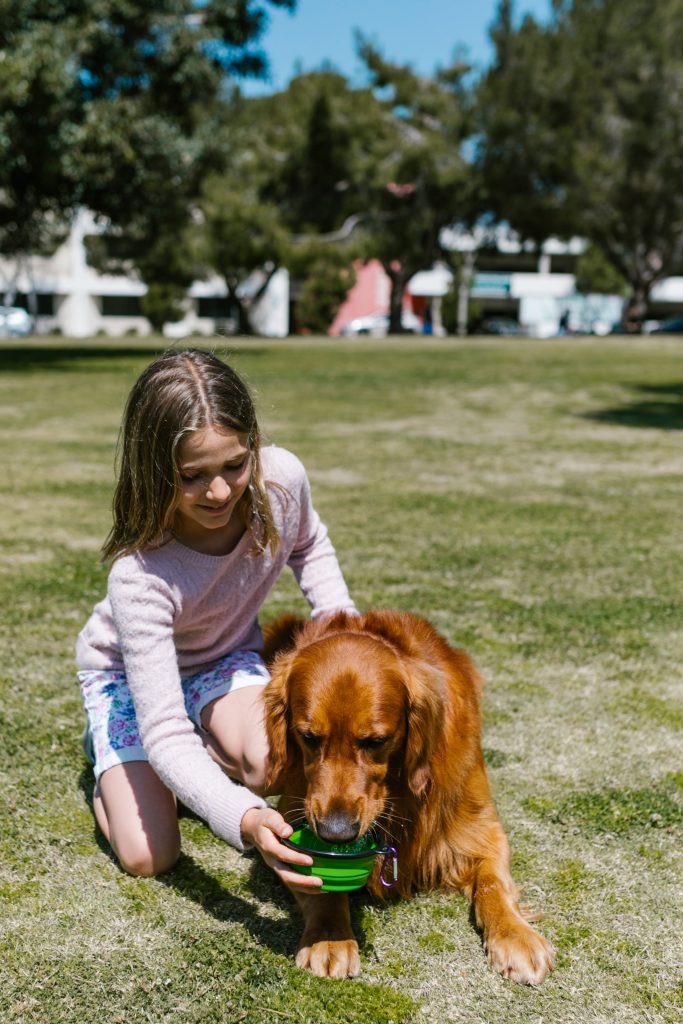
Conclusion
In conclusion, it’s crucial for dog owners to be aware of the signs and symptoms of excessive drinking in senior dogs. Increased thirst can indicate underlying health conditions such as dehydration, urinary tract infections, kidney failure, diabetes mellitus, or Cushing’s disease.
Regular monitoring and recording of water intake, providing clean water, considering a canned food diet, and being alert for other symptoms are essential steps in taking care of our aging canine companions.
Remember to consult with a veterinarian if you notice any concerning changes in your senior dog’s water consumption.
FAQs
1. What does excessive drinking mean in senior dogs?
Excessive drinking in older dogs, known as polydipsia, is a sign of increased thirst. It can be a clue to underlying health conditions.
2. Why do senior dogs drink so much water?
Illnesses often lead to excessive water consumption in older dogs. Increased drinking can also result from weight gain and obesity.
3. What are some signs of too much thirst in aging pets?
Symptoms of excessive thirst in senior dogs include frequent urination and changes in their eating habits.
4. Are there risks if my old dog drinks lots of water?
Health concerns relate to your aging pet’s heavy water intake. Excessive drinking could point at serious medical issues needing veterinary care.
5. How can I help my elderly dog if it drinks too much?
You should take your senior dog for check-ups often if you notice more than usual thirst or other odd actions.


